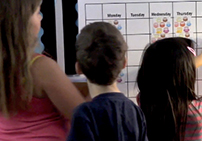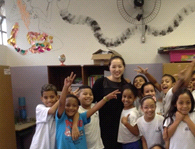
News & Updates
Get the latest news about the Good Behavior Game and the work we do with our local and international partners.
News
In the News: The Good Behavior Game in Nebraska
-

The Good Behavior Game in action – students meeting behavioral expectations and “winning” the game, 3rd grade class.
The Good Behavior Game Team partnered with the Nebraska Department of Education to implement the Good Behavior Game in about 50 schools across the state. Joe Dejka, World-Herald staff writer, reported on the implementation in his article, Competing to be courteous: Nebraska teachers try game promoting good behavior through peer pressure.
“A lot of students are coming to school with very little background knowledge compared to, say, some students, maybe, at an upper-middle-class school,” commented Lawrence Tunks, Principal of Alcott Elementary School in Hastings, Nebraska. He also said that their home lives often lack structure, so the structure and expectations of school are “completely foreign."
"I think what the Good Behavior Game does is, it breaks those expectations down for students and allows them to be more manageable.” Tunks also noted that the kindergartner who struggles with school rules can “absolutely” benefit from the game. -

Dr. Gail Chan from the Good Behavior Game Team visiting a classroom in Brazil.
The Good Behavior Game Team joined the National Coordination of Mental Health, Alcohol, and Other Drugs (Brazilian Ministry of Health) to pre-pilot the Good Behavior Game in Brazil. The government of Brazil mobilized the funds through the United Nations Office on Drugs and Crime (UNODC), who served as the project executors in partnership with the government team.
This is the first time that GBG has been implemented in Brazil. As part of the cultural adaptations, they renamed the game to “Elos,” meaning links and connections. The goal of the pre-pilot was to test the feasibility and acceptability of the game and its components, as well as the potential to promote positive changes in Brazilian classrooms. Six local coaches delivered the teacher trainings and ongoing support, and AIR staff trained and supported the Brazilian federal team and the local GBG coaches.
The pre-pilot was conducted in three public schools in the state of São Paulo (two schools in the municipality of São Bernardo de Campo and one in São Paulo) and three schools in the state of Santa Catarina (two in the city of Tubarão and one in Florianópolis). A total of 1,069 students, 45 classrooms and 39 teachers participated. Students ranged in age from 6-12 years old. Elos was implemented by teachers in first through fifth grade for a period of two months in November and December, 2013.
Overall, teachers were positive about their experience with the Elos Game. More than 64% indicated it was simple to implement in their classrooms. On average, teachers played the game two to three times a week, for 10-30 minutes at a time, and across a range of subjects. Nearly 60% of teachers considered the game to be a useful tool for managing student behavior and would recommend it to other teachers and directors (i.e. principals). Furthermore, 53% of teachers had high motivation to continue to use the game in the classroom.
More than half of the sample of directors and teachers were in favor of continuing with the Elos Game in the future. The federal prevention team in Brazil noted that the greatest accomplishments of the game were changes in teaching practices. Teachers indicated that students learning to work in a team improved behavior in the classroom and supported the introduction of new learning strategies. While some modifications will need to be made to the model of training and support to ensure successful implementation in the Brazilian context, the Good Behavior Game (Elos) is capable of promoting positive changes in the behavior of students and teachers in Brazilian schools. The Good Behavior Game is internationally recognized best practice
-

Drs. Sheppard Kellam (Johns Hopkins University) and Jeanne Poduska (American Institutes for Research) with Queen Silvia of Sweden.
The American Institutes for Research (AIR) received the Mentor Foundation’s “International Best Practice Award” for its work on the Good Behavior Game. Queen Silvia of Sweden, founder of the Mentor Foundation, presented the award on September 20th, 2012 at the Foundation’s International Gala in Washington, D.C.
Read more about Mentor International -
http://mentor-adepis.org/the-good-behaviour-game/
http://gbguk.org/

